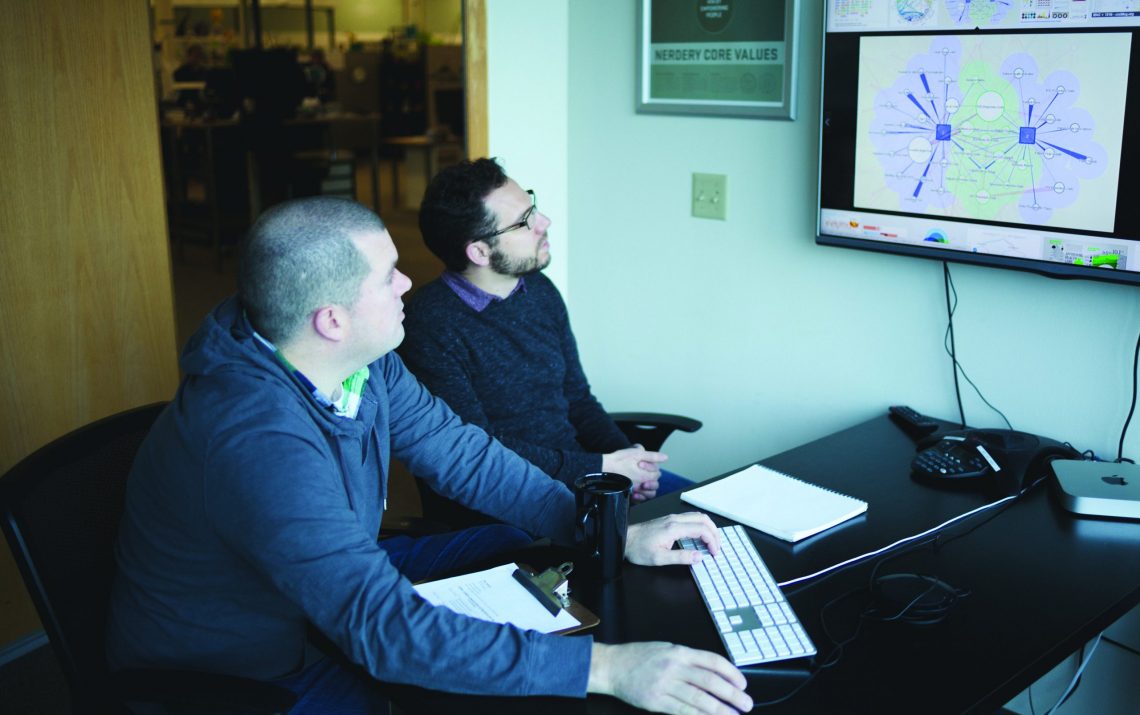Nerdery CEO Tom O’Neill talks data science with Josh Klun, a technology manager at The Nerdery
O’Neill: There’s a lot of buzz in the business community about data – can you give me your “nerd’s-eye” view on data science, big data, data engineering and the field of analytics?
Klun: These terms are all related. Big data literally means, “lots and lots of data” – more data than you can effectively comprehend. That’s a simple definition on something far less simple to actually sort out. We’ll get to that.
Data science is applying data with statistical methods and software to do analysis – this is the math behind the analytics for modeling and projections. It helps people understand their data through visualizations. Using reporting tools, we can make data reveal itself through meaningful pictures – valuable visual aids for informed business decisions. Data on its own isn’t useful, but if it’s organized and understood, data guides strategic direction.
Data engineering takes models built in data science and applies them in more practical roles. Data engineers assist the data science team throughout the process by preparing and moving the data, environment setup and developing the necessary tools to integrate the analytical models for ongoing business use. In data engineering, you’re determining steps to actually change the projections or trajectory of future data – informed by past data and uncovered by setting up environments to process algorithms.
One more data term for context. When you don’t know what you don’t know, data mining brings answers to the surface for data scientists to study. Data mining can be an instructive place to start.
O’Neill: What are some everyday examples of companies using data science to “get it right” with their target audience or market?
Klun: Consider Netflix. Have their recommendations resulted in shows you’ve binge-watched? Also, Amazon – how are they doing at guiding items into your shopping cart, just a click from your front door? Good data will have predictive power. Smart companies can use data to disrupt their industry.
Mayo Clinic and UnitedHealth Group partner on meaningful work with data science. They’ve built systems and tools to analyze huge repositories of patient records and medical data to learn where health care is excelling.
O’Neill: If those companies have figured it out, are they done with data science?
Klun: They’re not done, not by a long shot. Data science is a journey because data keeps changing over time. A data scientist has to iterate their model. If you predicted an outcome, great. Now, figure out how to keep predicting it correctly.
The entire health care industry is evolving rapidly with technology. With data science, health care is a leader in this evolution with innovative approaches that provide better patient care and we’ve only scratched the surface.
Based on past behavior (purchases, clicks, likes), companies understand consumers and master their market. Watching Web traffic analytics is just the start. What seems like too much data is actually a good problem to have.
O’Neill: How will organizational leaders know what success looks like using data science?
Klun: Success in data science depends on what you’re measuring, and the outcomes and impact you seek. If a health care company’s data reveals a 75 percent probability they can save a life, that other 25 percent is pretty daunting. However, to a retail company, a 25 percent increase in sales is all upside. Once an organization realizes power in understanding their data, they’ll want to stay on top of it and view it through visual dashboards for stakeholders to act on.
O’Neill: What’s a typical company’s point of entry into exploring data science?
Klun: There are many points of entry, but usually, it starts with company leaders looking to solve a business problem. We’re at a point of technological sophistication now where we can process large amounts of data to glean insights. The barrier to entry is low – thanks to the cloud, you can access virtual servers and resources that let you investigate and analyze data without investing in hardware. It’s a great starting point to see if your data is good enough to get accurate results. Data science reveals things businesses previously only wished they could somehow know.






